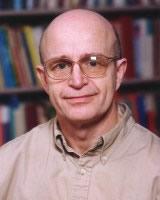
Ever since Einstein, physicists have sought a Theory of Everything, an ultimate explanation of how the Universe works. Ever since Freud, however, few psychologists and neuroscientists have tried to develop a comparable universal theory to explain the human mind, how and why people think and behave the way they do. Most were content to focus on specific aspects of behavior rather than the big picture, perhaps believing that such an overall theory of the mind could ever be found. John R. Anderson has dedicated his life to proving otherwise. With his hugely influential ACT-R theory, he has created the most comprehensive and cohesive cognitive theory yet developed.
For much of their history, psychology and the scientific study of the mind were considered "soft" disciplines, lacking the rigid empirical basis of the older "hard" sciences such as physics and chemistry. That began to change when advances in neuroscience and computer science made it possible to more directly understand the physical structure and workings of the brain. Throughout his career, Anderson has used these advances as a foundation upon which to construct an increasingly more sophisticated series of theories to model how human beings think and act. But he is more than simply a theoretician. He has extended his ideas into practical applications that have not only advanced the work of his fellow scientists but enhanced the education of thousands of students.
Born in Vancouver in 1947, Anderson did his undergraduate work at the University of British Columbia before moving on to Stanford to obtain his Ph.D. in Psychology in 1972. He taught at Yale for several years and in 1978 joined the faculty of Carnegie Mellon University, where his is now the R. K. Mellon University Professor of Psychology and Computer Science. With his doctoral advisor Gordon Bower, he detailed the HAM theory in the 1973 book Human Associative Memory, a work that integrated much previous research on memory into new mathematical models. Then, building on this work and that of others, including Franklin Institute Medalist Allen Newell and his SOAR concepts, Anderson developed the first version of the ACT (Adaptive Control of Thought) theory. He presented the theory in its fullest form in his seminal 1983 book The Architecture of Cognition, which prompted Allen Newell to proclaim ACT "the first unified theory of cognition" and the standard to which all others should be compared.
Scientists use cognitive structures such as ACT both to explain the mind and to simulate its workings with computer models. Anderson's ACT was immediately and enthusiastically embraced by those within the cognitive science community. But Anderson was not satisfied merely with ivory tower successes or laboratory confirmation of ACT. Searching for ways to apply ACT to solve practical problems, he turned to developing educational applications. He seized upon the concept of intelligent tutoring systems from contemporary AI (artificial intelligence) work as a perfect arena to test ACT concepts in the real world.
Working with colleagues including his former student Ken Koedinger, Anderson created ACT-based computer tutoring systems that used interactive techniques to teach math and computer programming. Early trials proved that students using these systems learned the material much faster and attained better grades than other students limited to traditional textbook methods. Anderson expanded the promise of these successes into a collaborative program with the Pittsburgh public school system, with tutoring software for algebra courses that could run on personal computers available to the schools. The Cognitive Tutor Algebra course was wildly successful and was soon embraced by other schools. Eventually a dedicated company, Carnegie Learning, was founded to market the cognitive tutoring software to school systems nationwide, and at present, Anderson's intelligent, interactive tutors are being used by half a million students in almost 2600 schools.
The development of the tutoring systems and the real-world data provided by their use, along with further research by Anderson and others involving new techniques such as functional MRI studies, have also led to further refinements of ACT, which is now known as ACT-R (Adaptive Control of Thought-Rational). Anderson's most recent book, How Can the Human Mind Occur in the Physical Universe? provides the latest synthesis and expression of ACT-R and Anderson's groundbreaking work, and its title perhaps best summarizes the main question that has driven this tireless, innovative scientist throughout his career. He continues to strive for ever more complete and elegant answers.for that elusive "Theory of Everything" for the human mind.
Information as of April 2011

